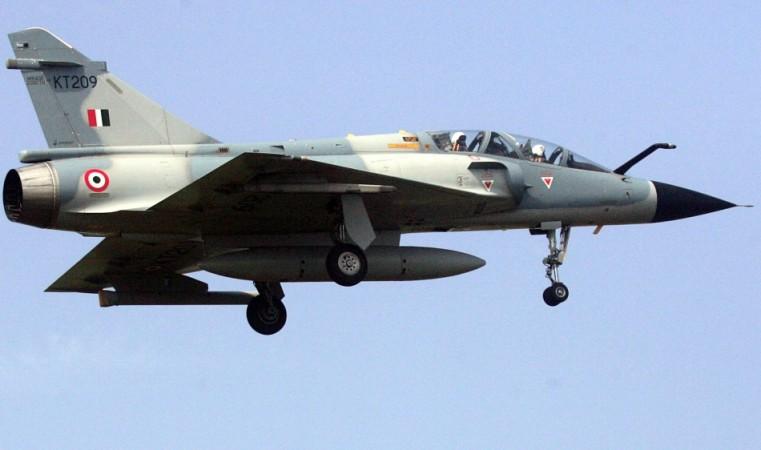
Pakistani defence forces were clearly caught napping when Indian Mirage 2000 combat jets entered their airspace and pounded to smithereens a Jaish-e-Mohammed (JeM) training camp in Balakot, deep beyond the line of actual (LoC), in the wee hours of Tuesday. Islamabad's first response to New Delhi's retaliatory attack to avenge the February 14 Pulwama suicide strike showed how much shaken it was by the tactical brilliance of the whole operation.
Islamabad's response to the targeted air strikes that New Delhi claimed destroyed a massive terrorist training camp will be limited by the huge constraints the nation faces, both of a military and non-military nature.
While a retributive response to the Pulwama suicide strike was a political imperative for Prime Minister Narendra Modi's government in India with the general elections weeks away, Prime Minister Imran Khan is not under such a compulsion, having recently begun his stint at the helm. Still, he will be compelled to show some intent of aggression to keep his supporters happy.
Pakistan, therefore, will try to raise a diplomatic storm over the incident but its general isolation will limit its success. An immediate military offensive, apart from intensifying cross-border firing along the LoC, can be ruled out considering the perils of further escalation and more international condemnation it could bring.
Pakistan will not let go of its strategic terror assets overnight but will have to be more cautious in using them. The Inter-Services Intelligence (ISI) that controls these assets could lie low for a while. But, the soft Indian targets in Afghanistan and elsewhere will be deemed fair game for its terrorist allies.
Pakistan will surely launch a diplomatic offensive but its isolation will prove extremely painful. The recent condemnation of the Pulwama terror strike in the United Nations Security Council (UNSC) where even its all-weather ally China did not side with it showed how isolated Islamabad is on terrorism.
The Paris-based Financial Action Task Force (FATF) has also been unusually critical of Pakistan's failure to safeguard its financial system from the risk posed by terror financing and money laundering. Therefore, a diplomatic offensive will have limited success beyond Islamabad's close Arab allies.
The initial Pakistani response to the air strikes was in the shape of a subdued tweet from Major General Asif Ghafoor, the director-general of Pakistan's Inter-Services Public Relations (ISPR), like reporting a routine airspace violation. "Indian aircrafts intruded from Muzaffarabad sector. Facing timely and effective response from Pakistan Air Force released payload in haste while escaping which fell near Balakot. No casualties or damage." The twitter handle @OfficialDGISPR added: "Payload of hastily escaping Indian aircrafts fell in open."
Foreign Minister Shah Mahmood Qureshi's response, on the other hand, revealed Islamabad's discomfort from the brazen violation of its airspace by the bombers. He told media in Rawalpindi that Islamabad reserved its right to respond to the attack. Prime Minister Khan has convened an emergency meeting of the key National Security Committee, according to Dawn.
Defence observers say that while making the right noises is politically important, the military can only respond based on ground realities. The fact that emerging details reveal the IAF formation that entered the Pakistani airspace was a tactically sound one for maximum impact and minimum loss must have deterred any idea of confrontation.
Pakistani media claim F-16 fighter jets scrambled on detecting the approaching Indian Mirage 2000 flying at a low altitude to delay radar detection, having crossed into the Pakistan-administered Kashmir in the Muzzafarabad sector.
The Indian strike has shorn of the element of surprise and Pakistani military will not be able to pull off retaliation with the same amount of success that India enjoyed. This is because the Pakistani army and air force will be under the close watch of Indian reconnaissance aircraft and satellites and any movement will invite critical scrutiny.
Once the element of surprise is gone, the incoming aircraft will be at a huge disadvantage, according to defence experts. They have to travel farther than the defending interceptors and laden with ammunition and fuel, they will be slower.
The Israeli Python-5 travelling at four times the speed of sound, its beyond visual range variant Derby that can hit beyond 50km and Russian R-73 homing in on targets 40km away at two and a half times the speed of sound are formidable weapons on India's multirole fighters like Sukhoi 30 (Su-30MKI), Mirage 2000 and Mig-29 upgraded to UPG with improved avionics.














